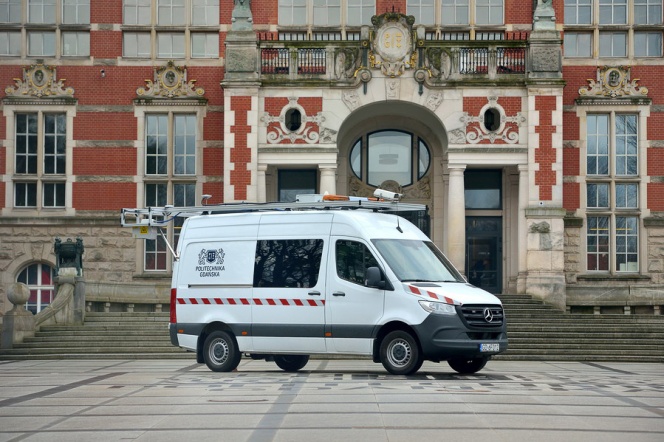Date added: 2023-04-03
A unique inspection vehicle to help researchers develop road maintenance strategies

– Over 5 000 national roads and motorways have been commissioned in Poland over the past several years. Effective maintenance and management of this constantly expanding road network requires appropriate diagnostics and assessment of the technical condition of their surface. Therefore, we plan to develop pavement maintenance strategies that would provide road administrators with guidelines to avoid expensive repairs, and thus traffic difficulties – says Piotr Jaskuła, DSc, associate professor, head of the Department of Transportation Engineering at the Faculty of Civil and Environmental Engineering at Gdańsk Tech.
In order to develop such strategies, the researchers will use the new vehicle equipped with a system measuring the functional properties of the pavement, which deteriorate as a result of heavy truck traffic and environmental factors. These include various types of cracks (the effect of low temperatures), ruts (formed during hot summer months), patches and cavities, but also the depth of the surface texture (determines anti-slip properties and is important for the safety of road users), and surface evenness (affects travel comfort).
3D sensors that detect damage
The vehicle itself functions as an inspection platform. The new tool has one of the most advanced systems currently available in the world, which uses high-resolution imaging and Laser Crack Measurement System.
– This system can detect damage on most types of road pavement, both asphalt and cement concrete, with high sensitivity and accuracy, at an early stage of their formation – says Marek Pszczoła, DSc, associate professor, from the Department of Transportation Engineering – The measurement is based on processing a high resolution 3D image of the surface. Specialized cameras record the pavement image, including a laser line image generated by laser projectors.
The data obtained as a result of the measurement are automatically analyzed to detect damage and deformation, as well as to determine their width and depth.
– An important element of the system is software that allows for automatic assessment and classification of damage. Moreover, not only can we obtain data, but basing on the analysis of these measurements, we can also predict damage and deformations that affect the durability of the pavement as well as the comfort and safety of users – adds Prof. Marek Pszczoła.
Measurement without traffic disruption
The vehicle, also equipped with an extensive GPS system that unambiguously locates damage, can move at the same speed as other vehicles in motion, e.g. 100 km/h, thanks to which the measurements do not cause traffic disturbances.
– This is extremely important for the safety of road users, as well as the reduction of social and environmental costs related to lack of congestion and traffic jams that could occur if we conducted research in a traditional way – underlines Prof. Piotr Jaskuła.
Researchers to support road administrators
Employees of the Road Construction Team, operating as part of the Transportation Engineering Department, have been conducting scientific research and research and development work for years, in order to make a field assessment of road sections and to analyze the causes of pavement damage along with their appropriate modeling. The new measurement tool will additionally allow to evaluate the progress of pavement distress. Based on the obtained data, the researchers will be able to develop degradation forecasts and surface maintenance strategies that will support road administrators, e.g. in planning interventions.
The vehicle and the system were purchased under the Gdańsk Tech Research Facilities program.

